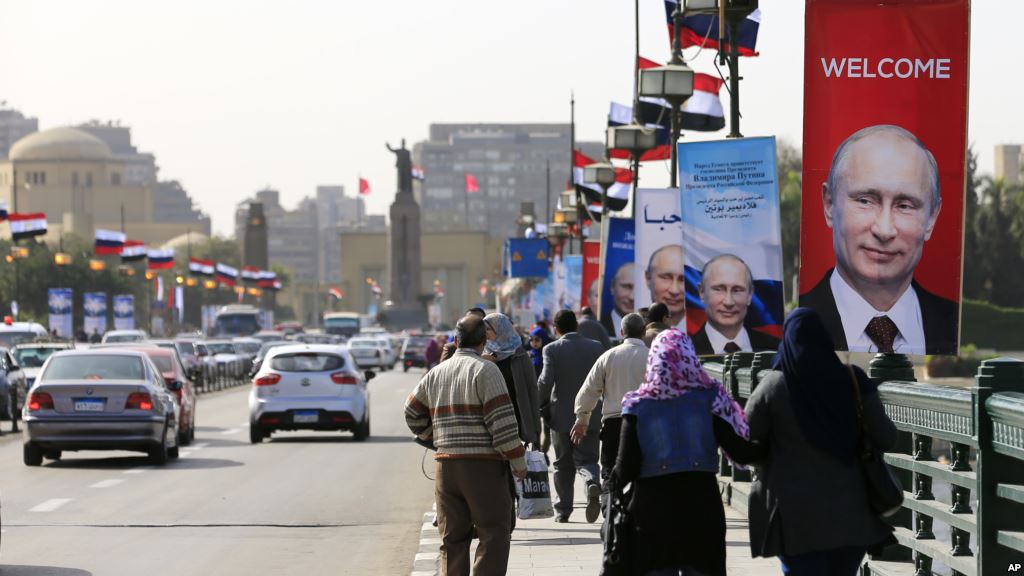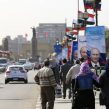
Russia Stirs the Pot in the Middle East
Publication: Eurasia Daily Monitor Volume: 12 Issue: 29
By:

While attention in the Middle East has focused mainly on the Islamic State or on Israel’s relationship with the United States, Russia has been busy trying to advance its own position in the region, chiefly at the US’s expense. Over the course of January and early February 2015, high-level Russian policymakers were particularly busy meeting with Middle Eastern governments either in Moscow or in local capitals; additionally, Russian officials tried to engage the region’s major players in public speeches. Thus, Foreign Minister Sergei Lavrov and Deputy Foreign Minister Grigory Karasin both gave public statements accusing Washington of supporting terrorism in the Middle East, even though it is Moscow that provides arms to Syria’s Bashar al-Assad, the government of Iran and, through them, Hamas and Hezbollah (Ministry of Foreign affairs of the Russian Federation, January 28).
Indeed, last month, arms sales featured prominently in many of Russia’s official discussions with Middle Eastern governments, as weapons deals are one of the few means that Moscow still has to enhance its regional influence. In Baghdad, Russian officials announced that their country agreed to provide weapons to Iraq, which would be exempted from payment through 2017. The promised hardware will include armored vehicles, tanks and Mi-35 helicopters, among others (al-Araby al-Jadeed, January 20).
Similarly, discussions about arms sales figured conspicuously in the diplomacy preceding President Vladimir Putin’s February 9–10 visit to Egypt. One motive for this tightening of bilateral relations is certainly the common interest shared by Cairo and Moscow in thwarting the Islamic State, the Muslim Brotherhood and other, similarly inclined movements. However, Russia clearly also wants to weaken US influence in Egypt and recover the level of sway over this Middle Eastern country that Moscow enjoyed during the Cold War (see EDM, May 15, 2014). Indeed, Russia currently has $3.5 billion worth of arms contracts with Egypt, including sales of fighter jets, helicopters and air defense systems (Interfax, February 9)—which some observers interpret to mean the relatively advanced S-300 system (Kommersant, January 27).
Meanwhile, Russia and Iran have yet to reach an agreement on the sale of the S-300 years after Moscow suspended an earlier deal in order to cooperate on Western sanctions meant to pressure Tehran into halting its nuclear program. Iran still wants the S-300 (Sputnik, January 27), but in late January 2015, Foreign Minister Lavrov reassured his Israeli counterpart, Avigdor Lieberman, that no sales of this air defense system to Iran have occurred or are taking place (Rossiya Television 24, January 26).
Russia also continues to seek ways to insert itself into the Israeli-Palestinian peace process. Lavrov has publicly stated that Russia not only wants both sides to avoid fanning the flames of violence but also that Moscow stands ready to employ the potential of the “Quartet” of international mediators to promote a settlement. In addition to Russia, the Quartet on the Middle East includes the United Nations, the United States and the European Union. But the real prize for Russia is Israel’s apparent willingness to sign a free trade agreement with Putin’s pet regional integrationist project, the Eurasian Economic Union (Interfax, January 26). This Israeli gambit clearly reveals the growing divergence in Israeli-US foreign policy perspectives, and undoubtedly, Moscow will actively seek to exploit these cleavages as much as possible.
That said, the most important issues for Russia in the Middle East revolve around Syria and Iran. Here too, Moscow was quite active: Notably, Defense Minister Sergei Shoigu held several days of discussions in Tehran with his Iranian counterpart and other members of the Islamic Republic’s government regarding formulating a Syrian peace process that Moscow could control (Ministry of Foreign Affairs of the Russian Federation, January 26, 28). Moreover, Ali Akbar Velayati, Iranian President Hassan Rouhani’s top aide, admitted that Russo-Iranian cooperation has helped and presumably will continue helping al-Assad’s regime to resist the rebels. Both Tehran and Moscow, according to Velayati, are also determined to expand their bilateral relationship to deal with issues beyond Syria all the way to Afghanistan. Likewise, the two sides want to expand military-technical cooperation, i.e. arms sales, even if the S-300 issue remains unresolved. The clear goal of this cooperation, according to Rouhani’s aide, is for Russia and Iran to jointly have “durable impacts” on the regional security situation (FARS, January 29).
Moscow’s ambassador to Tehran, Levan Dzhagaryan, clarified that, first of all, Iran wants to cooperate with Russia in Central Asia against the Taliban and the Islamic State within the framework of the Shanghai Cooperation Organization, which Tehran is seeking to join. Furthermore, Ambassador Dzhagaryan alleged, Iran’s military-political leadership believes that Iran, Russia and the other Middle Eastern states should assume “full responsibility for ensuring security in the Middle and Near East, Central Asia and the Caucasus.” Naturally, this argument forcefully implies that any US or Western “interference” under the guise of fighting terrorism merely creates instability in the region (Ministry of Foreign Affairs of the Russian Federation, January 28).
Dzhagaryan also commented that Moscow and Tehran discussed enhanced bilateral military cooperation in the Caspian Sea as well as joint military exercises (Ministry of Foreign Affairs of the Russian Federation, January 28). So despite the failure to reach an agreement on the S-300, it appears that the two sides are, nevertheless, finding a way to work around that issue. One can assume that Russia will now likely support Iran more openly in the 5+1 negotiations over the Iranian nuclear weapons program—and such Russo-Iranian cooperation will likely be fueled by Moscow’s reinvigorated anti-Americanism.
What all this amounts to is a clear Russian effort to insert itself wherever it can in the Middle East, as both an anti-US alternative for regional players and great power in its own right. Thus, in this quest, Moscow stands ever ready to drive further wedges between Washington and its partners, allies and potential friends. None of these efforts by Russia will help bring about real peace in the Middle East and, if anything, they will only help prolong the multiple agonies that now afflict this region.




